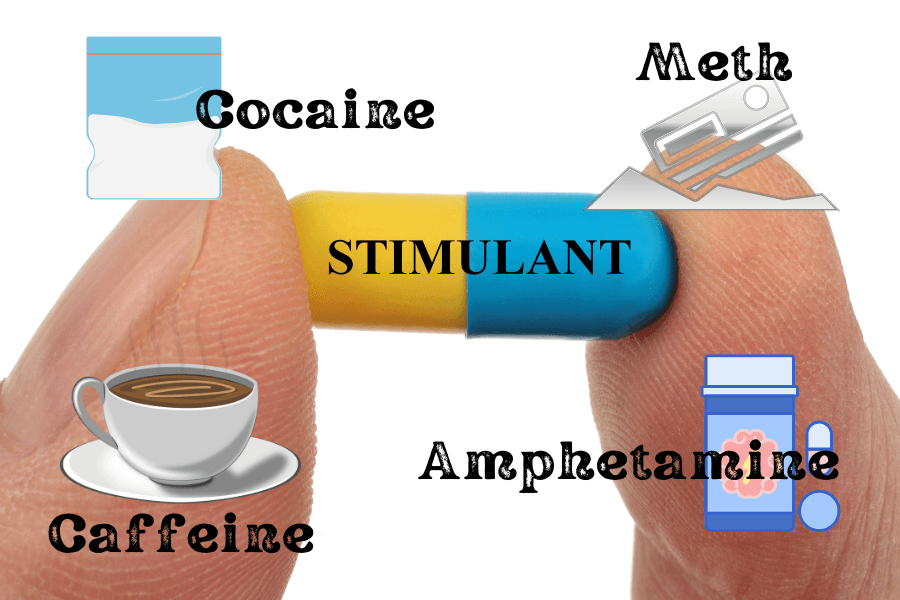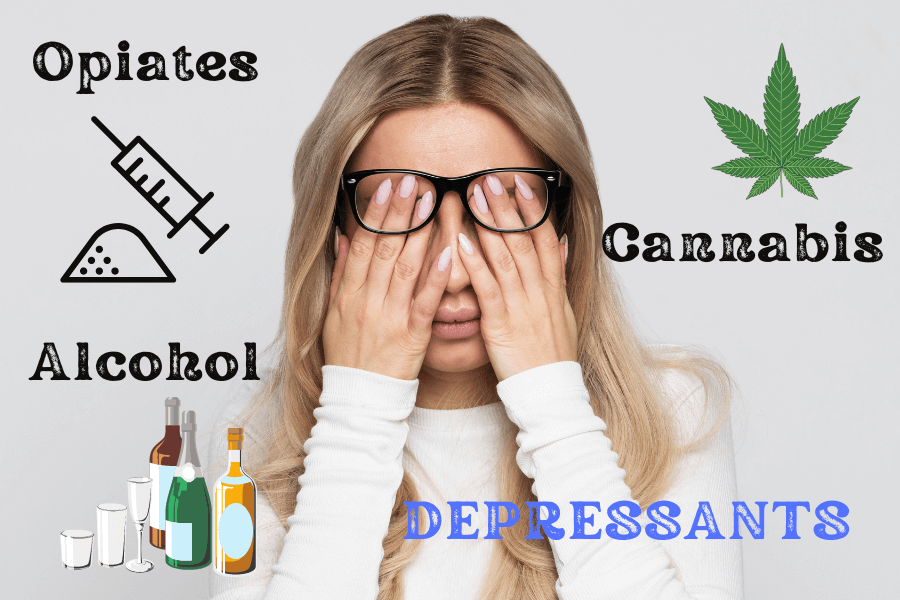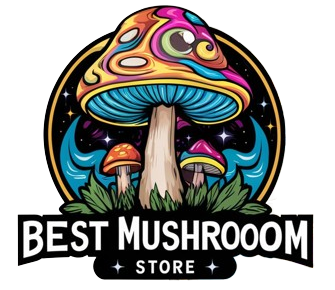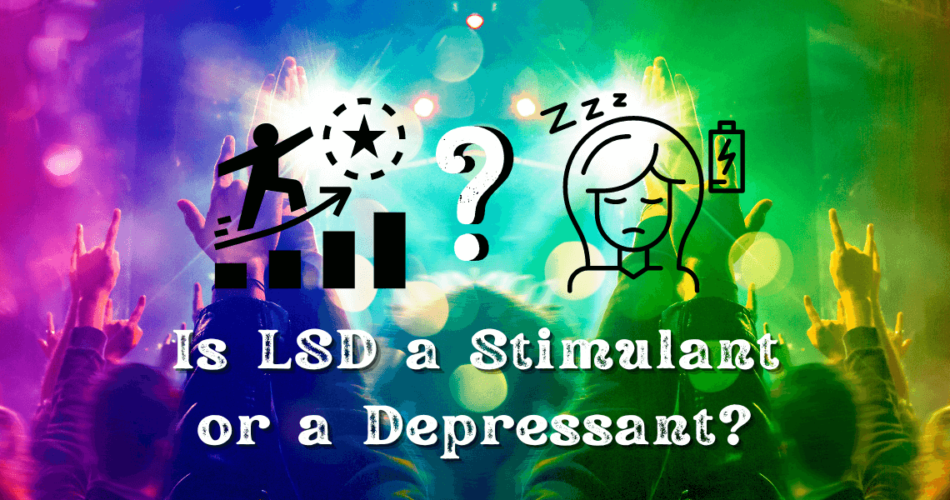It’s no secret that LSD has been used for centuries by people around the world. But what is this powerful substance? Is LSD a stimulant or a depressant? The answer is somewhat tricky! Join our quick guide on how to classify LSD.
TL;DR
- LSD is neither a stimulant nor a depressant – it’s a hallucinogen 💊
- LSD can mimic the effects of both stimulants and depressants, as it triggers the release of neurotransmitters, such as dopamine and serotonin 🧠
What Is a Stimulant?

Stimulants are substances that increase activity in the central nervous system or body. They can make you feel more alert and energetic. Examples of stimulants include amphetamine, caffeine and cocaine. These drugs act on the brain to increase energy levels and make users feel more alert and focused on tasks at hand. They can also cause dilated pupils.
What Is a Depressant?
Depressants work opposite to stimulants; they decrease activity in the central nervous system or body. They can make you feel calmer, less energetic, and even sleepy at times. Examples of depressants include alcohol, cannabis, and opiates like heroin. These drugs act on the brain to slow down mental processes, thus making users more relaxed or sleepy. So now, is LSD a stimulant or depressant? The answer lingers below!

Editor’s Note 🪶
There’s a misconception that “depressant” means “causes depression.” That’s not true. Depression is a mental illness that is independent of drug use, although it can get worse in people who abuse or overdose on drugs.
What Is a Hallucinogen?
Hallucinogenic substances alter perception, mood, thought processes, behavior, sensory experiences, or consciousness in general. They can produce feelings of euphoria or out-of-body experiences in extreme cases (e.g. with psilocybin). The most popular hallucinogen is LSD (lysergic acid diethylamide). This drug acts on the brain to induce altered states of consciousness which can involve visual or auditory hallucinations among other things depending on the dosages taken.
Some users of LSD may experience feelings of high energy and raised blood pressure similar to those experienced with stimulants, while others may feel relaxed similarly to those who use depressants in low doses. It’s neither, though, because it’s primarily classified as a hallucinogen. It alters perceptions of reality altogether, no matter if any stimulating/depressing effects are present or not after consumption, ingestion, absorption, etc.
| Stimulant-Like Effects of LSD | Depressant-Like Effects of LSD |
| feelings of high energy | disconnection from reality |
| raised blood pressure | distorted senses |
| increased heart rate | confusion and trouble concentrating |
| euphoria | nausea |
Is LSD a Stimulant or Depressant? The Bottom Line
So, is LSD a stimulant or depressant? LSD has characteristics of both stimulants and depressants, but its primary classification is that it’s a hallucinogen. This makes sense because LSD’s primary effect is altering perception rather than providing stimulation like some other drugs do (such as amphetamines, which are classed as stimulants because they energize users).
Those drugs are distinct from hallucinogens altogether, despite any stimulating effects the latter may have if consumed in small enough quantities. We hope this article helped clear up any confusion regarding: “Is LSD a stimulant or depressant?” Thanks for reading!
FAQs About Stimulants, Depressants, and LSD
Is Alcohol a Stimulant or a Depressant?
Alcohol is a depressant. Drinking it numbs the senses and puts a damper on full alertness. Even though some people experience stimulating effects in moderation, too much can cause severely negative consequences such as impaired judgement or sluggish thought processes.
Is Coffee a Stimulant or a Depressant?
Coffee is a stimulant. It can be a great way to give yourself an energy boost and increase focus, but it’s important not to overdo it. Too much of the stimulant brew can lead to unpleasant physical sensations like jitters or racing heartbeats.
Do Psychedelics Work for Depression?
Studies suggests that psychedelics such as LSD can indeed help patients with depression who don’t respond to traditional treatment. On the other hand, an LSD trip can heighten the emotions you’re already feeling, including despair. It’s vital to approach psychedelics with caution, keep the dose low, and have a professional guide you through it.
What Alcohols Are Uppers?
Alcohol is never a stimulant, if that’s what you’re asking. That said, tequila is believed to be more of an “upper” than a “downer.” The effects are subjective, and even if it does give you an energy boost, it’s not the alcohol in it but the agave. Alcohol still has a depressant effect on the body and mind.
Is Nicotine a Stimulant or Depressant?
Nicotine works like a stimulant drug at first. It can give your brain an energetic boost, but afterward, it takes its toll as a depressant with feelings of sluggishness and fatigue setting in.
Similar Posts:
- Drinking on Shrooms: Good Idea? Hallucinogen & Psychedelic Magic Mushrooms
- Adderall and LSD Trips: What Happens When You Mix Acid With Other Drugs?
- Shrooms and Beer: The Effects of Mixing Magic Mushrooms with Beer
- Caffeine and LSD: When Coffee Meets Drugs
- LSD and Alcohol: What Are the Effects of Mixing These Two Substances?
- LSD and ADHD | Can You Microdose Psychedelics as Stimulants?
- LSD and Xanax | Is Taking Xanax on an Acid Trip a Good Idea?




